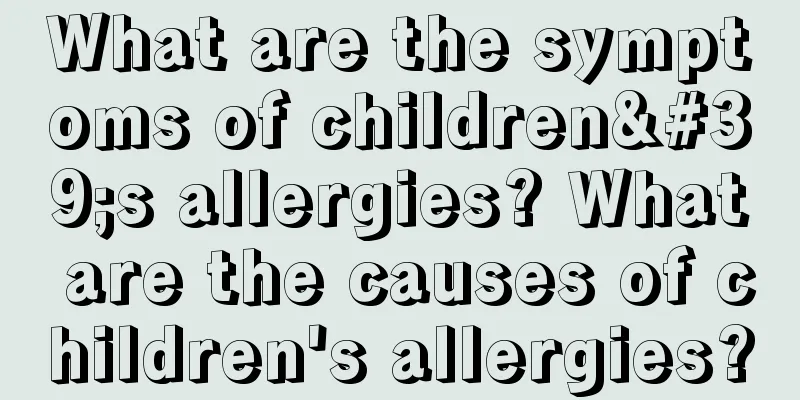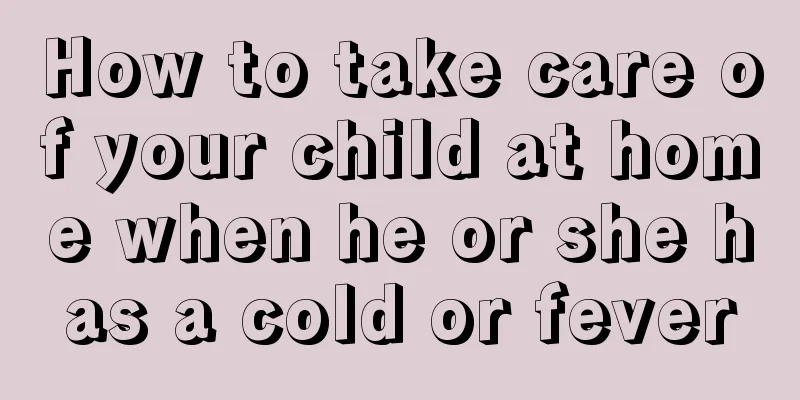What are the symptoms of children's allergies? What are the causes of children's allergies?

|
Children usually have very poor physical constitutions, and the allergens of many children are still unclear, so many children are prone to allergies. Therefore, we will learn about the symptoms of children's allergies and the causes of children's allergies. What are the symptoms of allergies in children?Skin erythema, papules, wheals, itching, diarrhea, mental irritability, loss of appetite, crying, etc. The most obvious symptoms of skin allergies in children are itching, dry skin, swollen eyelids, and swollen lips. If a child is allergic to a certain food, he will generally have gastrointestinal diarrhea and vomiting. If a child is allergic, pink or pale bulges will appear all over the body, obvious erythema, papules, blisters, etc., and local itching will also appear, which is also one of the symptoms of skin allergies. Children's allergies must first find the cause of the allergy. You can go to the hospital for an allergen test to see what the specific cause is. You can take levocetirizine hydrochloride oral solution or desloratadine dry suspension for anti-allergy. In normal times, you must pay attention to keeping the room clean, and the sheets and quilts should be changed and washed frequently. You cannot move in immediately after the decoration. In spring, try to reduce the time of outdoor activities to prevent allergies to pollen, actively participate in various physical exercises, and avoid emotional tension. Causes of allergies in children1. Carpets, quilt covers and other household items. The things that babies usually come into contact with the most at home are probably quilt covers, sofa covers, carpets and other household items. These things are also extremely easy to collect bacteria and dust. If they are not cleaned or disinfected regularly, babies are very likely to have allergies if they come into contact with them for a long time. 2. Some foods that are prone to allergies. Babies are still young, so in fact, milk should be the main food in most cases. Do not add adult food too early, especially some foods that are prone to allergies, such as mango, crab, eggs, etc. These may also cause allergies in babies. 3. Bacteria on pets. Some families keep pets, thinking that they can keep their babies company, but pets also have a lot of bacteria, especially the dander shed by pets, which can also cause allergies in babies. The baby's skin is prone to allergies, so mothers need to manage hygiene. It is best to clean the house every day and disinfect it regularly. Especially the baby's toys, because the baby's most contact with toys every day should be, in order to avoid baby allergies, a clean environment should be created. What are the consequences of severe allergies in children?Many of the baby's early allergic symptoms are precursors to a series of allergic symptoms in the future. Some symptoms seem to be cured, but as the baby grows, allergic symptoms will reappear in other ways. For example, babies who have suffered from eczema and food allergies will have more serious allergic diseases in the future, such as asthma, rhinitis, etc. Although skin allergies are a common skin disease, their harm should not be underestimated. Not only will it cause itchy and uncomfortable symptoms on the skin, but it can also easily cause some complications. For example, if the allergy occurs in the throat, it is easy to have symptoms such as difficulty breathing, chest tightness, and anaphylactic shock. In severe cases, it may also cause functional failure and lead to death, so be sure to take your child to timely treatment. What to do if your child has severe allergiesIf a child is allergic, the appropriate treatment should be given immediately. Any allergic reaction is caused by allergens, so first of all, you should pay attention to avoiding contact with allergens. This is the only way to completely prevent allergies. Once skin allergies occur, oral desensitization treatment with loratadine can be given. For chronic allergies that recur repeatedly, continuous oral desensitization drugs can be given, and compound glycyrrhizic acid and vitamin C can be taken orally continuously. For allergic reactions with difficulty breathing, go to the hospital immediately and inject dexamethasone to relieve allergic reactions and prevent suffocation. Breastfeeding can be used to eliminate skin allergies. At the same time, the dust in the bedroom should be reduced, the indoor environment should be kept clean, the air should be kept circulating, and the sheets, quilts, and clothes used by children should be changed and washed frequently. Hydrolyzed protein milk powder can be used to prevent allergies. At the same time, the humidity of the environment should be controlled. If necessary, the baby can be taken to the hospital for examination and desensitization treatment. |
>>: Can children with coughs be vaccinated? Can children with coughs be given milk?
Recommend
How do new mothers care for newborns and solve fatigue problems?
As a new mother, you must not know how to take ca...
What is Lansinoh? A maternal and infant brand that helps breastfeeding
Lansinoh is a maternal and infant brand registere...
Is childbirth painful? Does it require a doctor to press hard on your belly?
When it comes to the greatness of maternal love, ...
Can pregnant women eat pears? Healthy ways for pregnant women to eat pears
Pears are a very delicious fruit, but pregnant wo...
What should pregnant women do if they have a stiff neck? Can pregnant women with a stiff neck use cupping?
Stiff neck is a common problem when we sleep. Gen...
When is a caesarean section necessary? The most comprehensive knowledge on caesarean section
Comparing the recovery speed of natural birth and...
What is the reason for the varying amounts of milk supply during breastfeeding? What should I do if the amount of milk during breastfeeding varies?
Breast milk is the best nutrition for children, s...
Does a child look like his father or mother? Genetics explains how children inherit their appearance
Some parents will study which parent their baby l...
How to feed your baby medicine? What is the best way
When a child is sick, he needs injections and med...
What are the troubles of breastfeeding? 5 sad things about breastfeeding
I have been a wet nurse for 15 months. Looking ba...
How to prepare for pregnancy in summer
Summer is here. How can we married ladies prepare...
The complete list of baby names for the year of the rat with the surname Cao
Naming a baby is something that parents are very ...
How to prepare for having multiple babies? How much is the government subsidy for multiple babies?
The probability of multiple births is very small,...
Why do foreigners like to adopt Chinese children? There are many abandoned babies in China
In China, many children are abandoned by their pa...
Can babies take probiotics? Can babies take probiotics?
Probiotics are beneficial bacteria. Many parents ...









